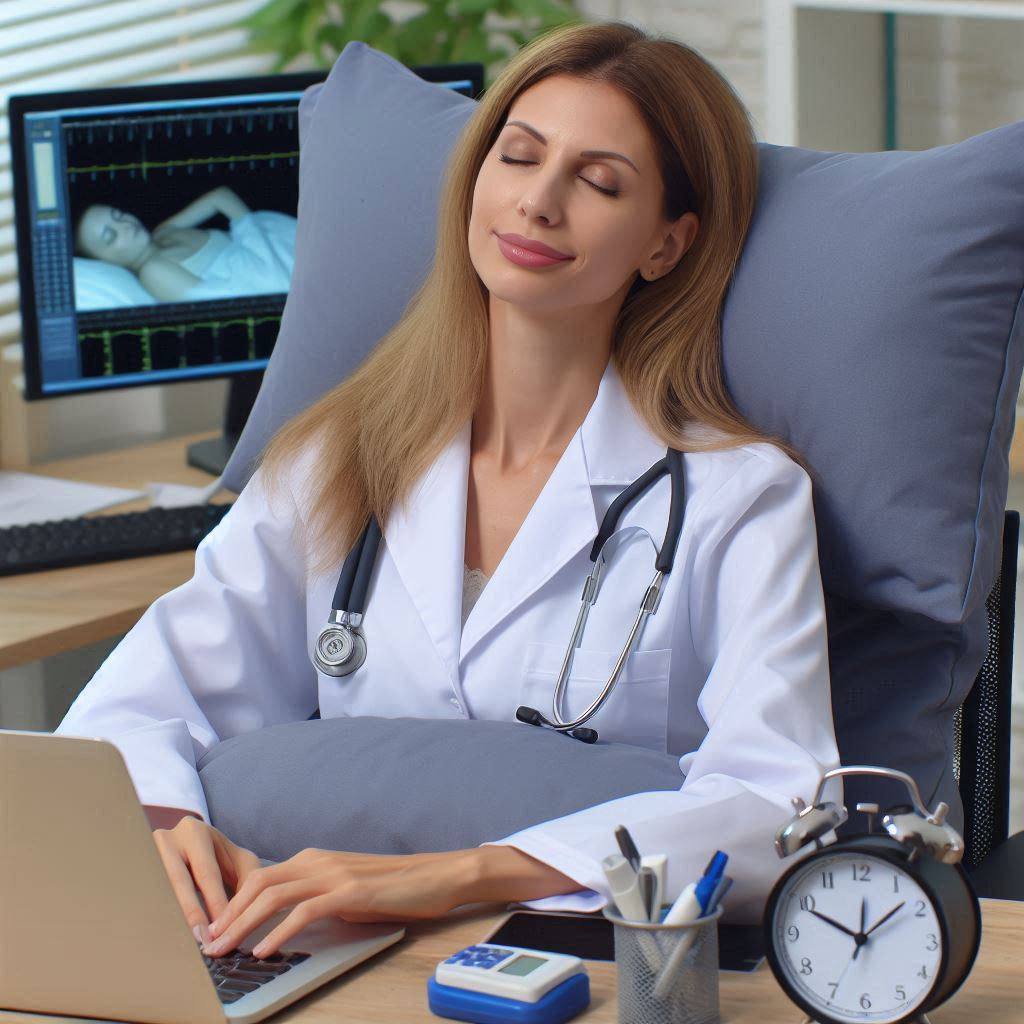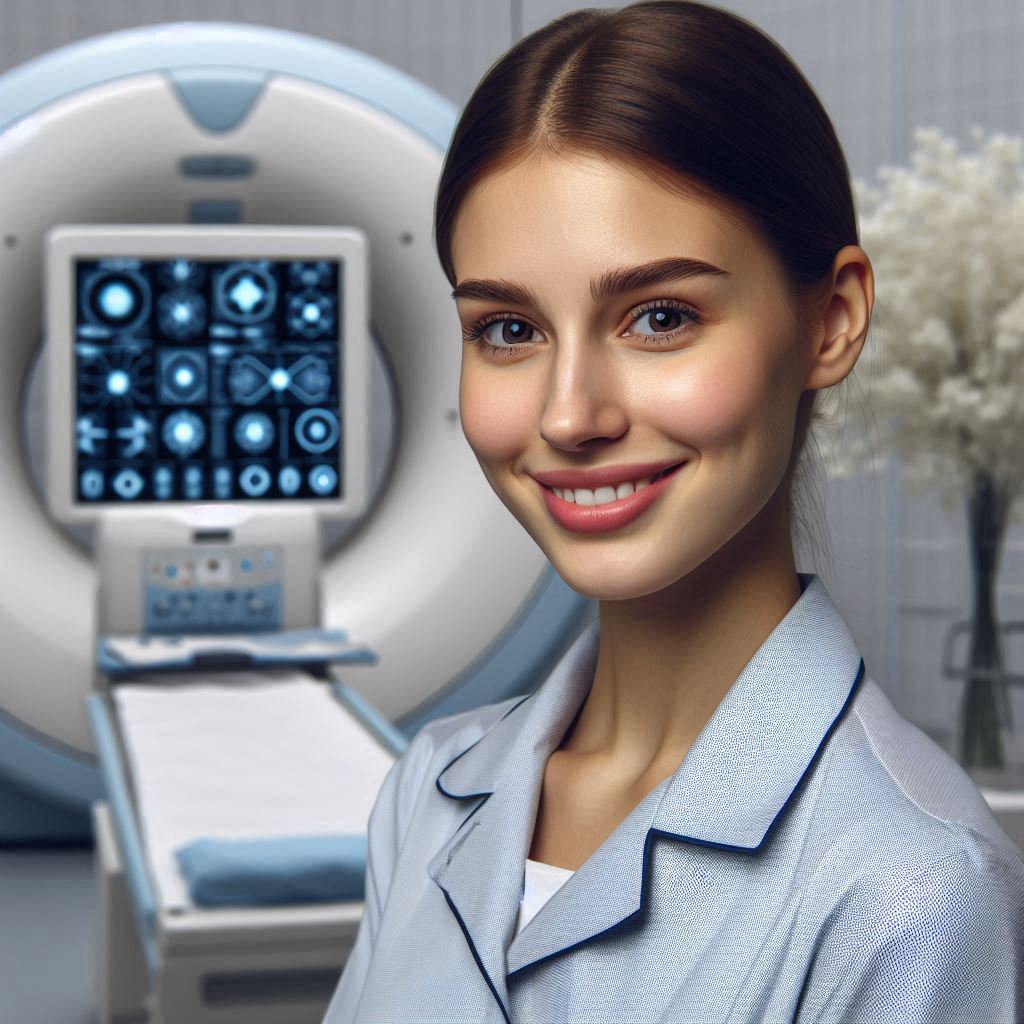Introduction
A sleep technologist plays a pivotal role in healthcare by specializing in monitoring and analyzing patients’ sleep patterns to diagnose and treat various sleep disorders.
Importance of Sleep Technologists in the Healthcare Industry
Sleep technologists are essential in healthcare as they ensure accurate diagnosis and effective treatment of sleep disorders.
Their work involves conducting polysomnography tests to assess sleep stages, physiological indicators like brain activity and heart rate variability.
By monitoring these factors, sleep technologists can identify conditions such as sleep apnea, insomnia, restless legs syndrome, and narcolepsy.
This information is crucial for healthcare teams in developing personalized treatment plans that improve patients’ sleep quality and overall well-being.
Collaborating closely with physicians and other healthcare professionals.
Sleep technologists provide valuable insights and contribute to multidisciplinary approaches to patient care.
In general, pursuing a career as a sleep technologist requires specialized training in sleep disorders, diagnostic techniques, and patient care.
It offers a fulfilling career path with opportunities to make a significant impact on patients’ health outcomes and quality of life.
Job Description
Role of a Sleep Technologist in Assessing and Diagnosing Sleep Disorders
A sleep technologist plays a pivotal role in assessing and diagnosing sleep disorders through specialized procedures.
They begin by preparing patients for overnight sleep studies, explaining the process and ensuring comfort.
During the study, technologists meticulously apply sensors to monitor various physiological signals like brain waves, heart rate, and breathing patterns.
Their expertise lies in observing and recording sleep stages, detecting abnormalities such as sleep apnea episodes or restless leg movements.
Technologists continuously monitor patients throughout the night, adjusting equipment settings as needed to maintain accurate data collection.
This hands-on approach allows them to identify patterns indicative of sleep disorders.
The Various Tasks Involved in Conducting Sleep Studies and Interpreting Results
Conducting sleep studies involves managing multiple tasks with precision and attention to detail.
Technologists monitor patients‘ sleep stages and behaviors, noting any changes or disturbances.
They analyze data in real-time, assessing sleep continuity, breathing patterns, and body movements.
Interpreting results is a critical aspect of the technologist’s role.
They use specialized software to score sleep stages and quantify events like apneas or hypopneas.
This analysis helps technologists identify specific sleep disorders and their severity.
Technologists prepare detailed reports summarizing findings, including recommendations for further evaluation or treatment by sleep medicine physicians.
By collaborating closely with physicians, sleep technologists contribute to accurate diagnoses and personalized treatment plans.
They communicate findings effectively, providing insights into patient sleep patterns and responses during the study.
Technologists play a key role in educating patients about their sleep disorders and the importance of treatment adherence.
In summarize, becoming a sleep technologist requires specialized training and expertise in conducting sleep studies and interpreting complex data.
Their role is essential in assessing sleep disorders, offering valuable insights that guide diagnosis and treatment decisions.
Technologists’ dedication to patient care and their role in advancing sleep medicine make them integral members of the healthcare team.
Education and Training Requirements
When considering a career as a sleep technologist, it is crucial to understand the educational background and training required to excel in this field.
The Educational Background Needed to Become a Sleep Technologist
To start your career as a sleep technologist, a high school diploma or equivalent is typically required.
Most employers prefer candidates with a background in healthcare or science-related fields.
Earning an associate degree in polysomnographic technology is highly recommended.
This program covers essential topics such as sleep disorders, physiology, and diagnostic techniques.
It provides a solid foundation for understanding sleep medicine.
Certification is essential for career advancement.
The most recognized credential is the Registered Polysomnographic Technologist (RPSGT) certification from the Board of Registered Polysomnographic Technologists (BRPT).
Eligibility requires completing an accredited polysomnographic technology program and passing the RPSGT exam.
Continuing education is necessary to maintain certification.
Technologists must earn continuing education credits regularly to stay updated with advancements in sleep technology and maintain their credentials.
The Training Programs and Hands-On Experience Required to Enter the Field
Training programs for sleep technologists focus on practical skills and clinical experience.
Many accredited schools offer polysomnographic technology programs that include classroom instruction and hands-on training.
During training, students learn to set up and calibrate sleep monitoring equipment.
They practice conducting sleep studies and monitoring patients during overnight studies.
Skills in data analysis and report preparation are also developed.
Clinical experience is crucial for mastering the intricacies of sleep technology.
Students typically complete supervised clinical rotations in sleep labs or healthcare facilities.
This hands-on experience allows them to apply theoretical knowledge in real-world settings.
Some employers may prefer candidates with additional certifications, such as CPR certification or basic life support (BLS) training.
These certifications demonstrate readiness to handle emergencies and ensure patient safety during sleep studies.
Technologists learn to collaborate effectively with healthcare teams and communicate clearly with patients.
These interpersonal skills are vital for providing compassionate care and ensuring patient comfort during sleep studies.
In essence, pursuing a career as a sleep technologist involves obtaining the necessary educational background and hands-on training.
Completing an accredited polysomnographic technology program and earning RPSGT certification are crucial steps.
Hands-on experience through clinical rotations prepares technologists for the challenges of diagnosing and treating sleep disorders.
Continuous education and training ensure technologists stay current in this evolving field.
Providing quality care and support to patients seeking improved sleep health.
Skills and Qualities
Essential Skills and Qualities of a Successful Sleep Technologist
Successful sleep technologists possess a diverse set of skills and qualities that enable them to excel in their role.
Attention to detail is paramount as they meticulously prepare patients and apply sensors for accurate data collection during sleep studies.
Strong communication skills are essential for explaining procedures to patients and reassuring them throughout the study process.
Technologists must also effectively collaborate with sleep medicine physicians, conveying detailed findings and recommendations.
The ability to work under pressure is crucial during overnight sleep studies.
Where technologists monitor multiple patients simultaneously and troubleshoot any technical issues that arise.
Adaptability allows technologists to adjust to varying patient needs and unexpected challenges during the study.
Problem-solving skills come into play when interpreting complex sleep data and identifying patterns indicative of sleep disorders.
Examples of How These Skills Are Utilized in a Typical Workday
In a typical workday, attention to detail ensures that sleep technologists accurately place sensors on patients, record precise observations throughout the night.
They meticulously monitor sleep stages, noting any deviations or significant events like apneas or leg movements.
This attention to detail is critical in identifying patterns that contribute to diagnosing sleep disorders.
Strong communication skills enable technologists to establish rapport with patients, explaining procedures clearly and addressing any concerns.
During the study, they maintain ongoing communication with patients to ensure comfort and compliance with study protocols.
Technologists also collaborate effectively with healthcare team members, discussing patient progress and sharing insights from the study results.
Working under pressure is a constant in the role of a sleep technologist.
Particularly during overnight shifts where they manage multiple patients and respond promptly to technical challenges.
They remain composed and focused, prioritizing patient care and data accuracy throughout the study.
Adaptability allows technologists to adjust equipment settings based on patient responses and environmental factors, ensuring optimal data collection.
Problem-solving skills come into play when troubleshooting equipment malfunctions or interpreting complex sleep patterns, contributing to accurate diagnosis.
In summary, the combination of attention to detail, strong communication skills, problem-solving abilities distinguishes successful sleep technologists.
These skills are instrumental in conducting effective sleep studies, interpreting data accurately, and supporting patients in managing sleep disorders.
Technologists’ commitment to excellence and patient-centered care underscores their critical role in advancing sleep medicine and improving patient outcomes.
Read: Continuing Education for Surgical Technologists: Why It Matters
Certification and Licensure
Importance of BRPT Certification
BRPT certification is highly regarded in the field of sleep technology.
It serves as a mark of excellence and demonstrates a commitment to upholding the highest standards of practice.
Sleep technologists who are certified by the BRPT are recognized for their expertise and dedication to improving patient outcomes.
Employers often prefer to hire certified individuals.
They have demonstrated their proficiency in the field through rigorous examination and experience requirements.
Licensing Requirements
While certification is important, it is also essential to understand the licensing requirements for practicing as a sleep technologist in different states.
Licensing regulations can vary from state to state, so it is crucial to research and comply with the specific requirements of the state in which you plan to practice.
- Some states may require sleep technologists to hold a state-specific license in addition to national certification.
- It is important to familiarize yourself with the licensing board in your state and ensure that you meet all the necessary requirements.
- Continuing education may be a requirement for license renewal in some states, so staying current on developments in the field is essential.
Final Thoughts
Obtaining certification from the BRPT and fulfilling licensing requirements are important steps in becoming a successful sleep technologist.
By meeting these professional standards, you demonstrate your commitment to excellence and uphold the integrity of the profession.
Stay informed about the latest developments in sleep medicine and continue to pursue opportunities for growth and advancement in your career.
Read: Understanding Ultrasound Technician Certifications

Discover More: Importance of Cultural Competence in Health Education
Transform Your Career Today
Unlock a personalized career strategy that drives real results. Get tailored advice and a roadmap designed just for you.
Start NowCareer Outlook
As you consider becoming a sleep technologist, it’s important to understand the career outlook in this field.
Here’s a detailed look at job growth, demand, career advancement opportunities, and specializations within the healthcare industry:
Job Growth and Demand
- The demand for sleep technologists is on the rise in today’s healthcare industry.
- With an increasing focus on sleep disorders and their impact on overall health, the need for qualified professionals in this field is growing.
- Hospitals, sleep clinics, and other healthcare facilities are actively seeking skilled sleep technologists to help diagnose and treat patients with sleep-related issues.
- The job growth for sleep technologists is expected to be higher than average, offering good opportunities for those entering the field.
Career Advancement Opportunities
- As a sleep technologist, there are various paths for career advancement within the field.
- One common advancement route is to become a lead sleep technologist, taking on supervisory roles within a sleep lab or clinic.
- Another option is to specialize in a specific area, such as pediatric sleep disorders or sleep research, to further advance your career.
- With additional training and experience, you could also move into roles such as sleep center manager or educator, expanding your impact in the field.
Specializations Within the Field
- Within the field of sleep technology, there are several specialized areas you can focus on.
- Some sleep technologists choose to specialize in working with specific patient populations, such as children or geriatric patients.
- Others may focus on specific sleep disorders, such as sleep apnea, insomnia, or narcolepsy, to develop expertise in treating these conditions.
- There are also opportunities to specialize in research, working on studies related to sleep disorders, treatments, and outcomes.
Overall, a career as a sleep technologist offers not only stability and job growth but also the chance to continually advance your skills and expertise in a rapidly evolving field.
By staying current on the latest research and technologies, you can make a meaningful impact on the lives of patients struggling with sleep issues.
Read: Advancement Opportunities for Surgical Technologists
Tips for Success
Offer Practical Advice for Aspiring Sleep Technologists
- Education and Certification: Start by obtaining a high school diploma or equivalent. Pursue an associate degree in polysomnographic technology to gain essential knowledge. Aim to earn the Registered Polysomnographic Technologist (RPSGT) certification for credibility and career advancement.
- Hands-On Experience: Seek out clinical training opportunities during your education. Gain experience in sleep labs to develop practical skills in conducting sleep studies, monitoring patients, and analyzing data.
- Professional Networking: Join professional organizations like the American Association of Sleep Technologists (AAST) or local sleep medicine associations. Networking events and conferences offer opportunities to connect with peers and industry leaders.
- Continuing Education: Stay current with advancements in sleep medicine through continuing education. Attend workshops, webinars, and seminars to learn about new technologies and treatment approaches.
- Certification Maintenance: Maintain your RPSGT certification by fulfilling continuing education requirements. This demonstrates your commitment to professional growth and ensures you stay updated with industry standards.
Networking Opportunities, Continuing Education Options, and Ways to Stay Updated on Advancements in Sleep Medicine
- Networking Opportunities: Attend conferences, workshops, and local section meetings of professional organizations. Engage in online forums and social media groups to connect with fellow sleep technologists and experts in the field. Networking enhances career prospects and fosters collaboration.
- Continuing Education Options: Explore accredited programs and courses that offer specialized training in sleep technology. Online platforms and university extensions often provide flexible learning options tailored to working professionals.
- Staying Updated on Advancements: Follow reputable journals, publications, and research studies in sleep medicine. Subscribe to newsletters and join online communities focused on sleep health. Participate in clinical trials or research projects to contribute to advancements in the field.
- Professional Development: Pursue additional certifications such as CPR or advanced life support (ALS). These credentials enhance your skills and readiness to handle emergencies during sleep studies.
- Mentorship: Seek guidance from experienced sleep technologists or mentors in the field. Mentorship offers valuable insights, career advice, and support as you navigate your career path.
By proactively engaging in education, networking, and professional development, aspiring sleep technologists can build a successful career in sleep medicine.
Embrace lifelong learning and stay informed about industry trends to provide quality care and contribute to advancements in sleep health.
Read: Work Environment for Surgical Technologists: Hospitals vs. Clinics
Conclusion
Becoming a sleep technologist requires dedication to specialized training and acquiring essential skills in sleep medicine.
Firstly, aspiring sleep technologists should start by obtaining a high school diploma or equivalent, focusing on coursework in sciences such as biology and anatomy.
Next, pursue formal education through an accredited sleep technology program.
These programs provide comprehensive training in sleep disorders, diagnostic procedures, and patient care.
Hands-on clinical experience is crucial during training, allowing technologists to apply theoretical knowledge in real-world settings.
This experience is typically gained through internships or supervised practice in sleep labs or healthcare facilities.
Certification is a significant milestone in the career path of a sleep technologist.
Obtain certification through recognized bodies like the Board of Registered Polysomnographic Technologists (BRPT) or the American Board of Sleep Medicine (ABSM).
Continuing education is essential for staying updated with advancements in sleep technology and medical practices.
Technologists can pursue additional certifications or attend workshops and conferences to enhance their skills and knowledge.
Lastly, pursuing a career as a sleep technologist offers a fulfilling opportunity to contribute to healthcare by improving patients’ sleep quality and overall well-being.
Embrace this path to make a meaningful impact in the field of sleep medicine and help individuals achieve better health through better sleep.




